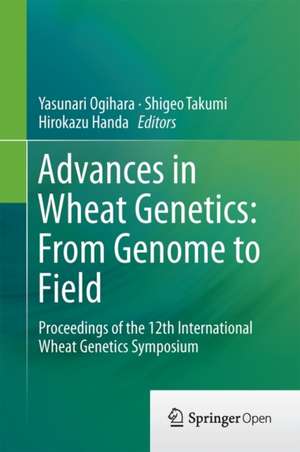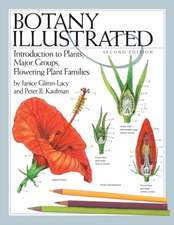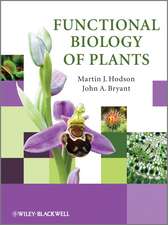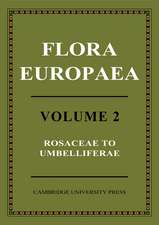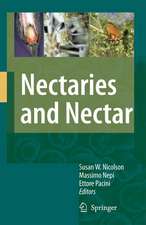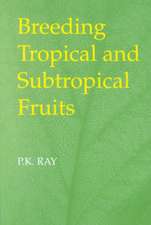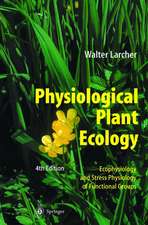Advances in Wheat Genetics: From Genome to Field: Proceedings of the 12th International Wheat Genetics Symposium
Editat de Yasunari Ogihara, Shigeo Takumi, Hirokazu Handaen Limba Engleză Hardback – 25 sep 2015
| Toate formatele și edițiile | Preț | Express |
|---|---|---|
| Paperback (1) | 430.97 lei 6-8 săpt. | |
| Springer – 23 aug 2016 | 430.97 lei 6-8 săpt. | |
| Hardback (1) | 405.22 lei 39-44 zile | |
| Springer – 25 sep 2015 | 405.22 lei 39-44 zile |
Preț: 405.22 lei
Nou
Puncte Express: 608
Preț estimativ în valută:
77.54€ • 79.99$ • 64.71£
77.54€ • 79.99$ • 64.71£
Carte tipărită la comandă
Livrare economică 24-29 martie
Preluare comenzi: 021 569.72.76
Specificații
ISBN-13: 9784431556749
ISBN-10: 4431556745
Pagini: 445
Ilustrații: XVI, 445 p.
Dimensiuni: 155 x 235 x 27 mm
Ediția:1st ed. 2016
Editura: Springer
Colecția Springer
Locul publicării:Tokyo, Japan
ISBN-10: 4431556745
Pagini: 445
Ilustrații: XVI, 445 p.
Dimensiuni: 155 x 235 x 27 mm
Ediția:1st ed. 2016
Editura: Springer
Colecția Springer
Locul publicării:Tokyo, Japan
Public țintă
ResearchCuprins
Part I Wheat Genetics: Past, Present, and Future.- 1 Prof. H. Kihara’s genome concept and advancements in wheat cytogenetics in his school.- 2 How a gene from Japan revolutionized the world of wheat: CIMMYT’s quest for combining genes to mitigate threats to global food security.- Part II Germplasm and Genetic Diversity.- 3 Genetic resources of Triticum.- 4 Development of core set of wheat (Triticum spp.) germplasm conserved in the National Genebank in India.- 5 Transfer to wheat of potentially new stem rust resistance genes from Aegilops speltoides.- 6 Genetic variation and its geographical distribution in Aegilops caudata L.: morphology, hybrid sterility and gametocidal genes.- Part III Cytogenetics and Allopolyploid Evolution.- 7 Wheat chromosome analysis.- 8 New aneuploids of common wheat.- 9 Chromosomal changes over the course of polyploid wheat evolution and domestication.- Part IV Toward Whole Genome Sequencing.- 10 Comprehensive functional analysesof expressed sequence tags in common wheat.- 11 Development of the BAC physical maps of wheat chromosome 6B for its genomic sequencing.- Part V Structural and Functional Genomics.- 12 Sequencing of wheat chromosome 6B: toward functional genomics.- 13 Genetic mechanisms of vernalization requirement duration in winter wheat cultivars .- 14 Building ultra-dense genetic maps in the presence of genotyping errors and missing data.- Part VI Functional Gene Analysis and Molecular Tools.- 15 Exploiting comparative biology and genomics to understand a trait in wheat, Ph1.- 16 The specific features of anthocyanin biosynthesis regulation in wheat.- 17 Association of wheat miRNAs with hybrid incompatibility in interspecific crosses of Triticum and Aegilops.- 18 High efficiency wheat transformation mediated by Agrobacterium tumefaciens.- 19 extra early-flowering (exe) mutants in einkorn wheat generated by heavy-ion beam irradiation.- Part VII Biotic Stress Response.-
20 Stem rust resistance - two approaches.- 21 Germplasm enhancement for resistance to Pyrenophora tritici-repentis in wheat.- 22 Next Generation Sequencing enabled genetics in hexaploid wheat.- Part VIII Abiotic Stress Response.- 23 Genomics approaches to dissect the genetic basis of drought resistance in durum wheat.- 24 Hybrid breeding in wheat.- 25 Broadening the genetic diversity of common and durum wheat for abiotic stress tolerance breeding.- 26 Early maturity in wheat for adaptation to high temperature stress.- 27 Gene expression profiles involved in development of freezing tolerance in common wheat.- Part IX Improvement of Grain Quality.- 28 Coping with wheat quality in a changing environment - Proteomics evidence for stress caused by environmental changes.- 29 Starch modification: a model for wheat MAS breeding.- 30 Quality characteristics of soft kernel durum - a new cereal crop.- 31 Proposal of international gluten research group.- 32 Enlargement of the genetic diversity for grain quality in bread wheat through alien introgression.- 33 Complex G x E interactions and QTL clusters govern end-use quality traits in hexaploid wheat.- 34 A consistent QTL for flour yield on chromosome 3B in the soft winter wheat variety, Kitahonami.- Part X Marker-Assisted Breeding.- 35 Recent improvements in Japanese wheat varieties.- 36 Determining the order of resistance genes Qsng-3BS, Fhb1 and Sr2 and combining them in coupling on wheat chromosome 3BS.- 37 Meta-analysis of resistance to Fusarium head blight in tetraploid wheat – implications for durum wheat breeding.- 38 Interest of a multiparental and outcrossing wheat population for fine mapping.- 39 The effect of Earliness per se (Eps) genes on flowering time in bread wheat.- Part XI Toward Sustainable Wheat Production.- 40 Recapitulating the OECD-CRP session (sponsored by the OECD’s Co-operative Research Program on Biological Resource Management for Sustainable Agricultural Systems.- 41 Exploring genetic resources to increase adaptation of wheat to climate change.- 42 Genomic approaches towards durable fungal disease resistance in wheat.- 43 Review and new progress in wheat wide hybridization for improving the resistance to biotic and abiotic stresses.- 44 Global crop improvement networks to bridge technology gaps.- 45 Genomic selection in plants: empirical results and implications for wheat breeding.- 46 Dietary fibre: wheat genes for enhanced human health.- BM Appendix I: Program.- Appendix II: Poster Presentation List.- Appendix III: Committees.
20 Stem rust resistance - two approaches.- 21 Germplasm enhancement for resistance to Pyrenophora tritici-repentis in wheat.- 22 Next Generation Sequencing enabled genetics in hexaploid wheat.- Part VIII Abiotic Stress Response.- 23 Genomics approaches to dissect the genetic basis of drought resistance in durum wheat.- 24 Hybrid breeding in wheat.- 25 Broadening the genetic diversity of common and durum wheat for abiotic stress tolerance breeding.- 26 Early maturity in wheat for adaptation to high temperature stress.- 27 Gene expression profiles involved in development of freezing tolerance in common wheat.- Part IX Improvement of Grain Quality.- 28 Coping with wheat quality in a changing environment - Proteomics evidence for stress caused by environmental changes.- 29 Starch modification: a model for wheat MAS breeding.- 30 Quality characteristics of soft kernel durum - a new cereal crop.- 31 Proposal of international gluten research group.- 32 Enlargement of the genetic diversity for grain quality in bread wheat through alien introgression.- 33 Complex G x E interactions and QTL clusters govern end-use quality traits in hexaploid wheat.- 34 A consistent QTL for flour yield on chromosome 3B in the soft winter wheat variety, Kitahonami.- Part X Marker-Assisted Breeding.- 35 Recent improvements in Japanese wheat varieties.- 36 Determining the order of resistance genes Qsng-3BS, Fhb1 and Sr2 and combining them in coupling on wheat chromosome 3BS.- 37 Meta-analysis of resistance to Fusarium head blight in tetraploid wheat – implications for durum wheat breeding.- 38 Interest of a multiparental and outcrossing wheat population for fine mapping.- 39 The effect of Earliness per se (Eps) genes on flowering time in bread wheat.- Part XI Toward Sustainable Wheat Production.- 40 Recapitulating the OECD-CRP session (sponsored by the OECD’s Co-operative Research Program on Biological Resource Management for Sustainable Agricultural Systems.- 41 Exploring genetic resources to increase adaptation of wheat to climate change.- 42 Genomic approaches towards durable fungal disease resistance in wheat.- 43 Review and new progress in wheat wide hybridization for improving the resistance to biotic and abiotic stresses.- 44 Global crop improvement networks to bridge technology gaps.- 45 Genomic selection in plants: empirical results and implications for wheat breeding.- 46 Dietary fibre: wheat genes for enhanced human health.- BM Appendix I: Program.- Appendix II: Poster Presentation List.- Appendix III: Committees.
Textul de pe ultima copertă
This proceedings is a collection of 46 selected papers that were presented at the 12th International Wheat Genetics Symposium (IWGS). Since the launch of the wheat genome sequencing project in 2005, the arrival of draft genome sequences has marked a new era in wheat genetics and genomics, catalyzing rapid advancement in the field. This book provides a comprehensive review of the forefront of wheat research, across various important topics such as germplasm and genetic diversity, cytogenetics and allopolyploid evolution, genome sequencing, structural and functional genomics, gene function and molecular biology, biotic stress, abiotic stress, grain quality, and classical and molecular breeding. Following an introduction, 9 parts of the book are dedicated to each of these topics. A final, 11th part entitled “Toward Sustainable Wheat Production” contains 7 excellent papers that were presented in the 12th IWGS Special Session supported by the OECD. With rapid population growth and radical climate changes, the world faces a global food crisis and is in need of another Green Revolution to boost yields of wheat and other widely grown staple crops. Although this book focuses on wheat, many of the newly developed techniques and results presented here can be applied to other plant species with large and complex genomes. As such, this volume is highly recommended for all students and researchers in wheat sciences and related plant sciences and for those who are interested in stable food production and food security.
Caracteristici
Gathers recent advances in wheat research in a single volume, with contributions by international experts Presents comprehensive coverage of multiple aspects of wheat sciences, from laboratory to field Provides practical guidance in genetic and genomic research that can be applied not only to wheat, but also to other species with complex genomes
